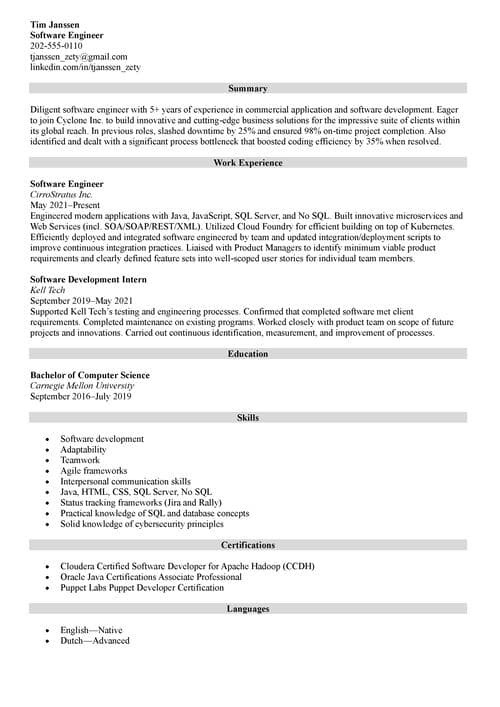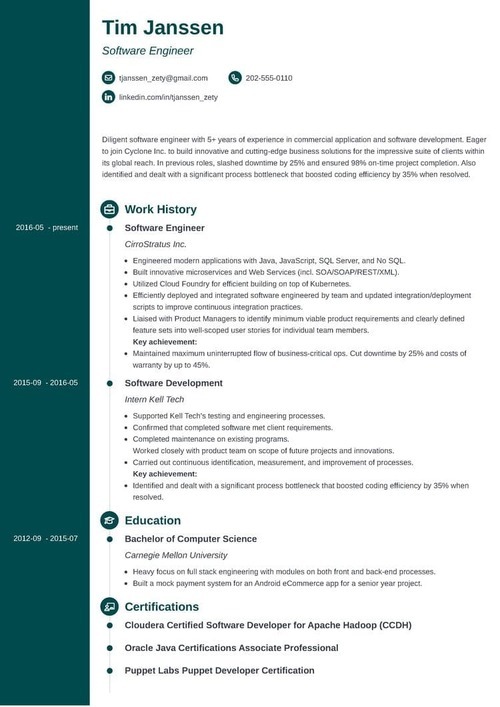
40+ Common Behavioral Interview Questions & Answers
Behavioral interview questions are all about finding solutions to a problem. So prove to your recruiters that they’re looking at a Kota Morinshini in problem-solving.
Got invited for an interview, and you feel like you’re going for a confession?
Easy there, easy.
You don’t do penance for telling recruiters your success stories.
Get ready for your next interview with our behavioral interview questions guide.
This guide will give you:
- 40 common behavioral interview questions and answers.
- Formulas to ace behavioral based interview questions.
- Expert solutions for how to get out of a tongue-tied situation during a behavioral-based questions interview.
- How to prep for the top categories of behavioral interview questions.
Want to save time and have your resume ready in 5 minutes? Try our resume builder. It’s fast and easy to use. Plus, you’ll get ready-made content to add with one click. See 20+ resume templates and create your resume here.
Sample resume made with our builder—See more resume examples here.
Looking for more interview questions? See:
- Best Informational Interview Questions
- Good Interview Questions & Answers
- Phone Interview Questions and Tips
- Zoom Interview Hacks
- Top 10 Interview Questions
- Questions to Ask an Interviewer
- Managerial Interview Questions and Answers
Dig deep into typical interview questions:
- Why Should We Hire You?
- Can You Tell Me Something About Yourself?
- What Are Your Strengths?
- What Is Your Greatest Weakness?
- What Motivates You?
- What Makes You Unique?
- How Do You Describe Yourself?
- Why Did You Leave Your Last Job?
- What Is Your Management Style?
- Where Do You See Yourself In 5 Years?
- Describe Your Current Job Duties
And here’s a handy list of contents for this article:
40 Common Behavioral Interview Questions
Expert Advice for the Stressed Out
Prepare and Be Ready to Expect the Unexpected
Now—
40 Common Behavioral Interview Questions
You’ll be coming to single-person or group interviews based on behavioral questions more often. This technique allows interviewers to predict your soft skills more accurately.
They’ll look for clues in your experience to predict your future behavior. So, you'll hear questions about how you handled a specific problem or the way you acted.
Recruiters will also try to break down your answer and probe for more info with more detailed questions.
Ouch!
To get out of there alive, use the STAR method to answer every behavioral question. Every. Single. One.
Here are the 40 top behavioral interview questions you were looking for. Find also answer triggers that’ll help you quickly think of a relevant example for your answer.
1. Stress Management
Use examples where you kept cool in stressful situations. And give evidence of how you handled stress and reduced its effects. Recruiters would want to learn more about your problem-solving skills rather than failures. So, answer their questions with examples where your glass was half full.
- Describe a time when something urgent came your way at the last minute. How did you handle it?
- Give an example of when you faced a stressful situation. How did you approach it?
- Tell me about a time when you couldn’t finish your tasks on time. What did you do in the end?
- Could you give an example of a time when you had to make an important decision, but you didn’t have enough experience for it?
- Describe a situation when you had a busy day and more work came to your desk. How did you handle that?
Inspirations for your answers: exam session, a significant role in a project, meeting new people, making an error, personal issues affecting work.
Take a look at a sample answer for the “Describe a situation when you had a busy day, and more work came to your desk. How did you handle that?” question:
| RIGHT |
|---|
Q: Describe a situation when you had a busy day, and more work came to your desk. How did you handle that?
A: It was the time before Christmas when everyone wanted to close their year and start clean in January. I had next year’s budgets to draft, requiring a deep focus for a couple of hours. The number of unread e-mails requiring my attention only grew. My coworkers needed me to sign off their items. But I had to close my priorities. So I outlined what was urgent, and I could finish that day and what was critical, but I could delegate. My boss was available, so we made a quick call and decided upon priorities and what my teammates could help me with. Based on everyone’s capacity, we shared the workload. We responded to what was necessary, with no need to do overtime or leave the stakeholders waiting. |
2. Decision Making
Talk about making logical and thought-out decisions and your critical-thinking skills. Discuss the process, not the result alone. The correlation between mass and energy hadn't been E=mc2 all along.
- Tell me about a situation you had to defend your point of view. How did it go?
- Give me an example of a time you had to make a tough decision.
- Could you tell me about when you covered your teammate and needed to make decisions on their behalf?
- Describe a time when you decided to change your approach 180 degrees. What urged you?
- Tell me about a time when you disagreed with your manager. How did you handle the conversation?
Inspirations for your answers: doing a group project, talking over a new process, researching and analyzing data, putting forward an unpopular opinion, playing sports.
See how to figure out an answer for the below question:
| RIGHT |
|---|
Q: Give me an example of a time you had to make a tough decision.
A: I was at the point of choosing a college. There was one in my state where I could stay at home and only take a train to get there every day. The other one was across the country, and obviously, it was more expensive. But it was a way better school with challenging courses. I would’ve needed to take a side job and study in the late hours. In the end, I went for the more expensive one after discussing it with my family. And it was a great decision. I managed to adjust my class schedule so well that the part-time job didn’t interfere with my grades at all. And I graduated from one of the top schools in the country. |
3. Adaptability
This is where you prove you do well in a changing environment. Explain how you adapt to a new communication or working style, feel in uncharted territory, and react to unpredictable situations. Improvise. Adapt. Overcome.
- Give an example of a situation where you had to do something for the first time. How did you approach it?
- Describe a time when you had to do something outside your scope of work.
- Tell me about a situation when you had to change your priorities. How did you go about it?
- Give an example of when you had to adapt to someone’s personality or style of work to achieve your goal.
- Tell me about a time you failed. How did you handle the situation?
Inspirations for your answers: missing an obvious point, best team player/teammate quitting, holiday/peak period in a company, teaching/explaining how something works, being in a multicultural environment.
Check out an answer example to the “Give an example of a situation where you had to do something for the first time. How did you approach it?” question:
| RIGHT |
|---|
Q: Give an example of a situation where you had to do something for the first time. How did you approach it?
A: I joined the vetting team. After a few months, my manager asked me to take over a process from another department. I took part in several meetings with the SME and went over every single step in the process. Then, created an SOP that described the process from beginning to end. And at the end of the project, I ran training with my team and took the questions that arrived to have them answered. The stakeholders were happy with the take-over and looked forward to our cooperation. At a town hall meeting, my manager recognized me in front of an entire department for a flawless job. |
4. Collaboration and Teamwork
Everyone says they thrive in collaboration, and recruiters love putting that to the test. Prove you’re Scottie Pippen to Michael Jordan, and you know what it means to be a team player. Understanding your position in working towards the same goal is crucial for scoring.
- Give an example of when you relied on the other person to get information, and they didn’t deliver. What did you do?
- Tell me about a situation when you gave feedback to your teammate. What were their reaction and the outcome?
- Give an example of working with someone situated higher in the company hierarchy.
- Describe a time when your team came to you to make a decision. How did it turn out?
- Tell me about a time when you had to cancel your commitments for a coworker.
Inspirations for your answers: playing team sports, trying to get insight from others, evaluation period at work/school, team-bonding activities, reaching a team goal.
Have a go with the below question and answer examples:
| RIGHT |
|---|
Q: Tell me about a time when you had to cancel your commitments for a coworker.
A: I was signing off and rushing for a bus to pick my daughter from school when my colleague stopped me to ask if I could help him fix a mass-mailing macro. He needed to send out a bulk communication to notify our staff about changes in the tax law. I knew it was necessary, so I called my wife and asked if she could pick up our kid while I stayed longer and helped. But I also asked my colleague to contact me to follow through so that he’d be able to fix the macro by himself next time. After a 20-minute call, we were free to go home. The next day, I received a text message from my boss, who thanked me for staying longer and helping the other team. Apparently, my colleague sent my boss an e-mail with recognition. |
5. Interpersonal Skills
You don’t have to run The Oprah Winfrey Show to excel at interviews. Show the recruiter that you know how to be patient with others, resolve conflicts, and understand your place in someone else’s picture.
- Describe a situation when you used your assertiveness. How did it go?
- Could you tell me about a time when you approached a person to pitch an untested idea? What was the outcome?
- Tell me about a time you had to handle a problematic person. How did you approach them?
- Give an example of a situation when you wanted to make a good impression. How did it end?
- Describe a time you had to finish a project with a person you didn’t like.
Inspirations for your answers: asking for help,using your strengths toavoid conflict, building a relationship with new coworkers, getting a task your colleague failed to complete, scheduling a meeting with your boss to discuss your promotion.
Take a glance at a sample answer for the below question:
| RIGHT |
|---|
Q: Describe a situation when you used your assertiveness. How did it go?
A: I was in the middle of working on a newsletter I had to finish that day and still had quite a lot of work to do. My colleague texted me if I could help her translate a paragraph for a pamphlet. She was confident that it would take only a couple of minutes. I understood she needed my help, but I texted her back to say that I wasn't available. I asked her if she had time in the afternoon. I needed to finish my assignment before I could help her with the translation. She hesitated but agreed eventually. She was very happy with the quality of my work and thanked me for taking the time to commit to the task. |
6. Communication
Find the words to prove you have Martin Luther King, Jr.’s communication skills. Use them to convince the recruiter that you can write an e-mail instead of holding a meeting.
- Could you describe a situation when you used your negotiation skills? What was the outcome?
- Tell me about a situation in which you were in the middle of a presentation and got distracted. How did you navigate the situation?
- Think of a time when you had trouble communicating with your colleague. What was the reason? How did you overcome it?
- Describe a time when you explained something complex to someone who had no clue about the topic. How did you do it?
- Give me an example of a situation when you had to use your writing skills to get your idea across. What was the result?
Inspirations for your answers: thinking about the recipient’s needs first, adjusting the tone and level of formality, writing or responding to online reviews, sharing or receiving bad news, delivering a presentation in front of a large audience.
Find out how to answer the “Describe a time when you explained something complex to someone who had no clue about the topic. How did you do it?” question:
| RIGHT |
|---|
Q: Describe a time when you explained something complex to someone who had no clue about the topic. How did you do it?
A: I was taking part in a project committee meeting about a big reorganization in the company. My role in the project was to supervise the technical part of it. The committee struggled to understand how the tool will reflect the structure after the transfer. I used an everyday analogy of a box when moving from a place to another. Some parts we can move ourselves and will fit, but others need reorganization. And for those, we’ll need the help of a moving agency. The meeting concluded with each party having the same understanding of the issue. We scheduled another meeting to brainstorm what to do with the second category boxes. |
7. Leadership
You choose the tallest to play center, but the quickest for the point guard. You know how to organize a team and assess skills to reach a common goal. Show in your responses that you’re the next John Wooden.
- Give an example of a situation where you had to delegate a task. How did you approach your teammate?
- Describe a time when you had to take over the leadership role in the middle of a project. How did you handle it?
- Tell me about a time when you motivated your teammate.
- Could you tell me about a situation when you wished you’d behaved differently? Why? How did you go about that?
- Give an example of a time when something wouldn’t have happened without you.
Inspirations for your answers: being open to new ideas, maintaining work-life balance, pulling resources from various places, seeking opportunities where no one else did, motivating a coworker.
Have a look at the below question and answer examples:
| RIGHT |
|---|
Q: Give an example of a situation where you had to delegate a task.
A: I was preparing for my annual leave, and it wasn’t possible to close one issue before my vacation. My manager decided that it couldn’t wait until my return, so I proposed to delegate it to my coworker. I set up a meeting with my teammate to explain the whole matter and share the e-mail exchange to fill her in. We’d sat down together a week before I left so that she could ask me questions in case of any doubts. I informed the involved stakeholder that I’d be gone for the following two weeks, and my colleague would take over the issue. The day before my leave, I set up an automated out-of-office response informing senders about my absence and that my teammate would be my backup for that time. Everything went smoothly, and the client thanked me for handling it that way. |
8. Taking initiative
It’s never about what is, but about what can be. Nikola Tesla also worked on things that weren’t broken. If you face questions about motivation, speak about your accomplishments and ideas that drive you.
- Tell me about a situation when you felt accomplished.
- Give me an example of a time when you went the extra mile for someone. Why did you do it?
- Describe a time when you took the initiative and opened a project.
- Could you tell me about a time when you made changes to improve your, your team’s, or your department’s efficiency?
- Give an example of when you foresaw an undesirable result. How did you tackle that?
Inspirations for your answers: receiving a scholarship, taking care of a relative, volunteering, pursuing a degree with dedication, using your knowledge and experience in a project to overcome challenges.
Give the below examples a go:
| RIGHT |
|---|
Q: Tell me about a situation when you felt accomplished.
A: Football is my passion, and I’ve been playing for twelve years now. Coach told us that there would be a draft to get into the state team. He picked two other players and me to take part. It wasn’t easy to prepare for the particular stages of the event. It required four hours of practice more each day and staying late to keep up with the curriculum at school. After all, the tears and sweat paid off. Together with my teammate, we joined the ranks of the best football players in the state. |
How to Answer Behavioral Interview Questions: Expert Advice for the Stressed Out
Alright. Here it comes—
“What if I can’t quickly find a relevant example for my answer?”
Don’t worry!
Thinking about your interview can throw an instant kill to the blood-tingling joy from receiving a callback. But—
What if you don’t need to have an immediate answer to all your recruiter’s questions?
Behavioral questions are designed to round out the candidate’s personality, i.e., what’s not on paper. For some, interviews can be stressful, and it’s not uncommon to run into mental blocks during an interview. If you can’t think of a quick response to a behavioral question, it’s important not to panic. Take your time to draw the most appropriate experience and to frame your answer properly. It’s better to delay your answer but deliver it perfectly than to deliver it rushed and seem as if you made it up on the spot.
Don’t be afraid to say that you need more time to reflect on the best-suited example. The quality of your answer is crucial. So, give yourself time to pick the right words with care.
Vague language, saying “we” instead of “I,” or throwing whatever comes to your mind at the interviewer is never a good idea. It’ll make you seem like a liar, and recruiters will do everything they can to pick your answers apart.
Let’s find ways to avoid that stinky liar label.
Prepare and Be Ready to Expect the Unexpected
Can you prepare sample answers for each behavioral interview question?
You can’t.
Behavioral questions have tons of variations. And learning your answers by heart is a poor strategy. (Your memory gets faulty under pressure.)
What you can do is—
Find ways not to get stuck, even if you hear a question you never saw coming.
How to Prepare for a Behavioral Interview
- Read the job description again and again. You’ll find competencies and qualities hiring managers look for and will build their questions on. Think of examples from your experience that respond to such a skill set.
- Look into your resume—you should still keep it in a .pdf version somewhere. If you tailored your resume to the job ad, it’ll hand you the most recent and relevant accomplishments on a plate.
- Think about situations outside your workplace experience. Snoop for your achievements from volunteering, class environment, or playing sports. You can also go for personal ones, like becoming a valedictorian, scoring a hat trick, or winning an award.
- Talk to yourself out loud. You won’t type your answers during your interview. So imagine the environment you’ll find yourself in and fake-test it out. Answer sample questions out loud to yourself or a friend using the STAR method. This way, you'll observe the words you use, how your body moves, and if you can keep eye contact. (You should, ideally.)
- Brace yourself for tons of questions about how you behaved in negative circumstances. Although the questions are in a negative tone, come up with examples where you made something good come out of a dire situation.
- Don’t mix up behavioral with situational interviews. The situational questions and answers are hypothetical (“What would you do if…”, “If I were…”), but behavioral touch upon your real-life experience (“Give me an example of…”, “I was…”).
Key Takeaway
Take these home after reading the behavioral interview questions guide:
- The job description is your bible. You’ll find there all qualities your future boss wants you to have.
- Think about situations from job- and non-job-related experiences during a behavioral interview.
- Apply the background-action-result structure to your answers.
- Tell the truth and ask for more time if you need.
- Practice makes perfect.
That’s it!
Off you go for an interview. Good luck!
Do you have questions about behavioral interview questions and answers? Perhaps we missed key behavioral-based interview questions? Give us a shout in the comments! Let's get the conversation rolling.




